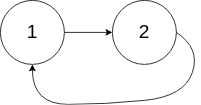Given
head, the head of a linked list, determine if the linked list has a cycle in it.There is a cycle in a linked list if there is some node in the list that can be reached again by continuously following the
next pointer. Internally, pos is used to denote the index of the node that tail’s next pointer is connected to. Note that pos is not passed as a parameter.Return
true if there is a cycle in the linked list. Otherwise, return false.Example 1:

Input: head = [3,2,0,-4], pos = 1
Output: true
Explanation: There is a cycle in the linked list, where the tail connects to the 1st node (0-indexed).
Example 2:

Input: head = [1,2], pos = 0
Output: true
Explanation: There is a cycle in the linked list, where the tail connects to the 0th node.
Example 3:

Input: head = [1], pos = -1
Output: false
Explanation: There is no cycle in the linked list.
Constraints:
The number of the nodes in the list is in the range
[0, 10<sup>4</sup>].
-10<sup>5</sup> <= Node.val <= 10<sup>5</sup>pos is -1 or a valid index in the linked-list.*Follow up: Can you solve it using
O(1) (i.e. constant) memory?题目大意:
求LL是否存在循环
解题思路:
快慢指针。若存在循环就一定会相遇,这是显然的。
解题步骤:
N/A
注意事项:
- 不涉及删除,所以不需要哟用到fake_node,但循环中先走再判断。
Python代码:
1 | def hasCycle(self, head: ListNode) -> bool: |
算法分析:
时间复杂度为O(n),空间复杂度O(1)



